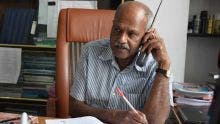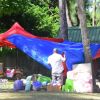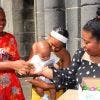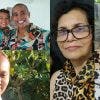
The Stakeholder Group on Ageing Africa (SGA Africa) of which DIS-MOI is a member is holding a Regional Expert Conference on The Human Rights Situation of Older Persons in Africa on 20 November 2019 in Abuja, Nigeria. Readers are aware DIS-MOI has been campaigning since its inception in 2012 in favour of a UN Convention for the Rights of Older Persons. In this context DIS-MOI made submissions to the 1o Session of the Open-Ended Working Group (OEWG) on Ageing in April last. This Regional Expert Conference stand as an Inter-sessional Event of the UN General Assembly OEWG for the purpose of strengthening the protection of the human rights of older persons. The below Concept note illustrates the background, the objective and the partners of this Conference.
Publicité
Background
In 2017, Africa was home to over 68 million older persons accounting for 7,1 per cent of the global total. In a global comparison, Africa may be considered the ‘youngest continent,’ however, between 2017 and 2050, the number of older Africans is expected to grow with a projected 229 per cent increase. In fact, the rate of growth of the older population of Africa projected for the 2040s is faster than any other region has experienced worldwide. Such a demographic triumph has profound consequences for every aspect of individual, community and national life. Population ageing is therefore poised to become a major issue in Africa, and it is essential to integrate this mega-trend within the larger process of development in the region.
The African Union Agenda 2063 (The Africa We Want) as well as the 2030 Agenda for Sustainable Development and its Sustainable Development Goals, provide blueprints of action for people of all ages, and are both explicitly grounded in human rights standards. In recent years, more African countries have adopted national policies on ageing and have set-up social protection schemes to tackle vulnerability including social pensions, agricultural subsidies and emergency relief.
Despite progress, growing old for many Africans is accompanied by deepening poverty. While family ties remain strong, traditional support systems have weakened due to migration, conflict, natural disasters and the impact of HIV and AIDS. Africa is the region with the highest labour force participation of older people, where they often engage in the informal sector with physically demanding work and no access to pensions.
Inadequate attention to older persons in popular and policy concerns exacerbates existing violations of their rights. Like other regions of the world, many African older men and women experience systemic inequality in economic and social domains. Older persons are reported to face barriers in accessing amongst others, basic social and healthcare services; access to labour market and decent work opportunities; access to financial and infrastructure services; and access to knowledge, education and training. Such inequalities are intensified and aggravated by the discrimination older people face based on their age. Combating discrimination based on age and promoting the dignity of older persons is fundamental to ensure that all Africans enjoy a life of fulfilment, health, security and active participation in their societies as they grow older.
The promotion and protection of all human rights and fundamental freedoms is important to achieve a society for all ages, in which older persons participate fully and without discrimination and on the basis of equality. However, experiences of older persons and the particular context of old age is still not sufficiently addressed from a human rights perspective. The United Nations Human Rights Office of the High Commissioner reports that when it comes to older persons, the current legal framework at both the national and international levels remain grossly inadequate and inconsistent, with only a limited number of countries that provide explicit guarantees of equality and non-discrimination on the basis of age.
In Africa, the Protocol to the African Charter on Human and Peoples' Rights on the Rights of Older Persons was adopted in 2016. Articles of the Protocol are the product of consultations and build on the 2002 African Union Policy Framework and Plan of Action on Ageing as well the United Nations Principles on Older Persons, which address independence, participation, care, self-fulfillment and dignity. To date, eleven countries have signed the Protocol and only one country has ratified.
Action to support the rights of older persons globally has been discussed at the United Nations General Assembly Open-ended Working Group, which was established in 2010 for the purpose of strengthening the protection of the human rights of older persons. In 2012, the African Union Conference of Ministers of Social Development expressed their support to the work of the Working Group by stating their commitment to “advocate for and support the elaboration of a UN Convention on the Human Rights of Older Persons, which would strengthen and reinforce the Protocol the African to the African Charter on Human and Peoples' Rights on the Rights of Older Persons in Africa and to continue promoting the Madrid International Plan of Action on Ageing.” The Stakeholder Group on Ageing Africa (SGA Africa) complemented this commitment by holding a High-level side event entitled “Independence, Autonomy and Rights of Older Persons in the African Context” at the 10th session of the Working Group in April 20196 .
Against the above backdrop, and in the run up to the 11th session of the Open-ended Working Group in April 2020, the Stakeholder Group on Ageing Africa (SGA Africa), in collaboration with the United Nations Department of Economic and Social Development (DESA) and the Office of the High Commissioner for Human Rights (OHCHR) will convene a one-day regional inter-sessional expert conference on the theme: The Human Rights Situation of Older Persons in Africa. The Conference will take place on 20 November 2019 in Abuja, Nigeria.
Objective
The objective is to provide a platform for a diverse set of stakeholders in the region, including Governments, national human rights institutions, civil society organizations, academia, older persons, regional organizations as well as intergovernmental institutions and United Nations organizations to discuss the human rights situation of older persons in Africa, and to enable a better understanding of progress made and challenges faced in ensuring those rights, as well as exchange related experiences and lessons learned. The Conference welcomes the participation of non-African member States and is open to a global audience.
The Regional Expert Conference serves as an ongoing debate in-between working sessions of the Open-ended Working Group and is of great importance to stimulating discussions at the upcoming 11th session of the Working Group, which will be held from 6 to 9 April 2020 at the United Nations Headquarters in New York.
Partners
Partners Permanent Mission of Argentina | DESA | OHCHR | International Institute on Ageing United Nations Malta (INIA) | National Human Rights Commission of Nigeria | International Federation on Ageing (IFA) | Dave Omokaro Foundation (DOF) | HelpAge International | Geriatrics Association of Nigeria (GAN) | Global Alliance for the Rights of Older People (GAROP) | International Network for the Prevention of Elder Abuse (INPEA) | Droits humains-Ocean Indien (DIS-MOI).
Vijay Naraidoo
President of the Commission for the Rights of Older People of DIS-MOI

Notre service WhatsApp. Vous êtes témoins d`un événement d`actualité ou d`une scène insolite? Envoyez-nous vos photos ou vidéos sur le 5 259 82 00 !





















